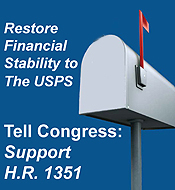August 12, 2011
USPS Seeks Legislation To Allow Layoffs, End Federal Benefits
APWU President Cliff Guffey has condemned Postal Service legislative proposals that would permit the USPS to layoff 120,000 employees and remove postal workers from the Federal Employees Health Benefits Program and from federal retirement programs.
“This is a clear attempt to abrogate our contract and destroy postal collective bargaining,” Guffey said. “Crushing postal workers and slashing service will not solve the Postal Service’s financial crisis,” he added.
Guffey Defends Workers on ‘The Ed Show’
APWU President Cliff Guffey appeared on The Ed Show on MSNBC Aug. 11 to discuss the latest attack on postal workers. Click on the image above to watch the six-minute video.
The Postal Service’s “Mandatory Stand-Up Talk” to employees made its proposals sound almost harmless: Management said, “The Postal Service is reviewing with Congress additional ways to improve our workforce flexibility as we adjust the size of our networks to meet operational needs and the changing marketplace.”
However, a “discussion draft” of proposals for Congress reveals the Postal Service’s goal: By 2015, the USPS intends to reduce the employee complement by 220,000, and projects that 100,000 jobs will be eliminated by attrition. “In order to eliminate the remaining 120,000 career positions… it is imperative that we have the ability to reduce our workforce rapidly,” the document says. [Click here to view a “discussion draft” of USPS healthcare and retirement proposals]
But postal employees are not the cause of the USPS financial crisis, Guffey said. “The USPS economic crisis is the result of a provision of the Postal Accountability and Enhancement Act of 2006 that requires the Postal Service to pre-fund the healthcare benefits of future retirees – a burden no other government agency or private company bears.” The mandate requires the USPS to fund a 75-year liability over a 10-year period and costs the USPS more than $5.5 billion per year. Guffey also pointed out that “the federal government is holding billions of dollars in postal overpayments to its pension accounts.”
“Congress must address the cause of the USPS financial crisis so that postal workers can continue to serve the American people and the USPS can continue to act as an important engine of the U.S. economy,” he added.
“There are some in Congress who may support these proposals,” Guffey noted. “But we will not allow the hard-working men and women of the U.S. Postal Service to be made the scapegoats for the outrageously poor judgment of Congress in instituting the pre-funding requirement.
“Congress created this mess,” he said, “and Congress can fix it.”
Take Action Now!
Guffey also said it is absolutely urgent that postal employees contact their U.S. representatives and urge them to support H.R. 1351 and to oppose H.R. 2309.
H.R. 1351 would address the cause of the USPS financial crisis without cutting pay and benefits, eliminating collective bargaining rights, or slashing service, the union president said. The bill, introduced by Rep. Stephen Lynch (D-MA), would allow the Postal Service to use billions of dollars in pension overpayments to meet its financial obligations — including the Congressional mandate to pre-fund the healthcare benefits of future retirees.
On the other hand, Guffey said, H.R. 2309, introduced by Rep. Darrell Issa (R-CA) and co-sponsored by Rep. Dennis Ross (R-FL), would do nothing to correct USPS overpayments to its pension accounts and do nothing to correct the congressional mandate that requires the USPS to pre-fund the healthcare benefits of future retirees.
H.R. 2309 would empower a board to unilaterally cut wages, abolish benefits, and end protection against layoffs; create a commission to order $1 billion worth of post office closures in the first year, and $1 billion worth of facility closures in the second year, increase employees’ costs for healthcare and life insurance, and eliminate the right to bargain over these crucial benefits. Contact Your Legislators.



